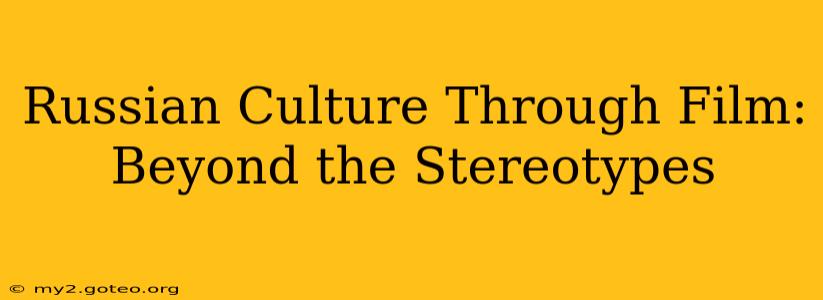For many in the West, Russian culture remains shrouded in mystery, often reduced to stereotypes fueled by Cold War narratives and limited exposure. However, delving into Russian cinema offers a rich and nuanced perspective, revealing a complex tapestry of history, social dynamics, and artistic expression far beyond the typical tropes. This exploration goes beyond the vodka-swilling, babushka-clad image often presented, instead revealing a vibrant and multifaceted cultural landscape.
What are some common stereotypes about Russian culture in film?
Common film stereotypes paint a picture of perpetually grim, stoic characters, often entangled in political intrigue or battling the harsh realities of a bleak, unforgiving landscape. These portrayals frequently focus on themes of suffering, oppression, and the pervasive influence of the KGB, neglecting the rich diversity of Russian experiences. While such elements have undoubtedly shaped the nation's history, they are far from the whole story. Other stereotypes include portraying all Russians as either intensely patriotic or fiercely rebellious, overlooking the vast spectrum of individual beliefs and perspectives.
How can films offer a more accurate and nuanced perspective on Russian culture?
Russian cinema, throughout its history, has provided a powerful counterpoint to these simplistic representations. Films, from the early Soviet era silent films to contemporary independent productions, showcase the diversity of Russian life and the intricacies of its cultural identity. For example, early Soviet films often celebrated collectivism and the socialist project, while later works tackled the complexities of post-Soviet transition, exploring themes of disillusionment, social upheaval, and the struggle for individual identity. Masterpieces like Andrei Tarkovsky's Stalker offer profound meditations on the human condition, transcending geographical limitations. More contemporary films tackle issues of social inequality, identity, and the search for meaning in a rapidly changing world. By actively seeking out diverse voices and perspectives within Russian cinema, we can develop a far more accurate understanding of its rich and complex cultural landscape.
What are some key themes explored in Russian cinema?
Several key themes recur throughout Russian cinema, revealing deeper insights into the national psyche and cultural values. These include:
- The impact of history: From the Tsarist era through the Soviet period and beyond, Russian cinema consistently grapples with the weight of history and its enduring legacy on the present. This often manifests in explorations of revolution, war, and political oppression.
- The relationship between the individual and the state: The power dynamics between the individual and the state – be it the Tsarist regime, the Soviet Union, or the post-Soviet government – frequently serves as a central conflict in many narratives.
- The role of spirituality and faith: Despite periods of state-sponsored atheism, spirituality often remains a powerful undercurrent in Russian narratives, manifesting in various forms, from overt religious symbolism to explorations of existential themes.
- The importance of family and community: Family and community bonds frequently play a significant role, often serving as a source of strength and resilience in the face of adversity.
- The struggle for identity: Whether national, individual, or collective, the search for identity—in a rapidly evolving society constantly wrestling with its past—is a recurring theme.
Are there any specific directors or films you recommend for understanding Russian culture?
Exploring Russian cinema is a journey of discovery, and numerous filmmakers have contributed to its rich tapestry. To begin your exploration, consider works by:
- Andrei Tarkovsky: A master of philosophical and visually stunning films like Solaris, Stalker, and The Mirror.
- Sergei Eisenstein: A pioneer of montage and influential figure in Soviet cinema, known for Battleship Potemkin.
- Nikita Mikhalkov: A contemporary director whose works, including Burnt by the Sun, offer nuanced portrayals of Russian history and society.
- Aleksandr Sokurov: Known for his intensely personal and visually captivating films, often exploring themes of power and history.
This is just a starting point. Many other remarkable directors and films await discovery, each contributing to a more comprehensive understanding of Russian culture.
What are some modern Russian films that challenge stereotypes?
Contemporary Russian cinema frequently challenges prevailing stereotypes by showcasing a diverse range of experiences and perspectives. These films often explore themes of social change, generational differences, and the complexities of modern Russian life, offering a counter-narrative to the often-repeated clichés. Actively seeking out and watching these films provides a far more balanced and informative understanding of modern Russia.
By engaging with Russian cinema critically and thoughtfully, we can move beyond the oversimplified narratives and appreciate the richness and complexity of Russian culture. It's a journey that will reward viewers with deeper insights, cultural appreciation, and a more nuanced understanding of the world.

